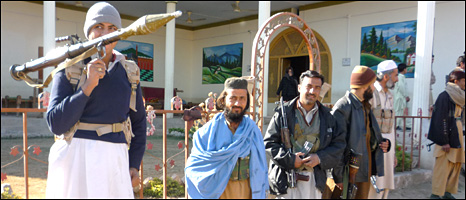|
|
|
The Adezai lashkar, just a few miles outside Peshawar. Image from the BBC. |
Two of the major reasons the Awakenings were so successful in Iraqi’s Anbar province and beyond were: 1) the Awakening received support from the Iraqi government and the US, to include military backup in case of an attack; and 2) there was close and continuous coordination between local Awakening movements and a larger Awakening structure.
Pakistan has attempted to battle the Taliban using local tribal militias, but so far Pakistan’s attempts to utilize local militias have been haphazard at best, and even treacherous in some cases. The BBC reports that in one town outside Peshawar, the provincial capital of the Northwest Frontier Province, there is little coordination between the government and local militia:
The villagers are funding the militia out of their own pockets. “We give clothes, shoes and food to the volunteers,” said Dilawar Khan. “Machine guns, ammunition, cars, we provide the lot. We buy the fuel for the vehicles.”
“It’s 18 months since we started this war,” said Mr Khan. “And until now we haven’t had a minute’s help from the government.”
While the Pakistani government supports lashkars in principal, in practice the Adezai lashkar has had little or no help. Mr Khan says their next battle will be with the authorities – to get them to play their part.
“We are fighting this war for the sake of our motherland,” he said, “to protect our village, our tribe and our religion. But we cannot handle it alone.”
There is “Taliban-held territory on three sides,” the leader of the Lashkar told the BBC. Again, this is just outside the provincial capital, Peshawar, which is only 15 miles away. Keep that in mind when you hear the Pakistani military state that the Taliban have been defeated in the tribal areas and the NWFP.
Farther north, in Bajaur, where the Pakistani military claimed it has defeated the Taliban, a lashkar is being supported by the government. The Salarzai tribe, which previously accused the military of targeting its leaders at the behest of the Taliban, is now rampaging through the region and is torching scores of homes said to be owned by the Taliban – more than 144 at last count.
Are you a dedicated reader of FDD's Long War Journal? Has our research benefitted you or your team over the years? Support our independent reporting and analysis today by considering a one-time or monthly donation. Thanks for reading! You can make a tax-deductible donation here.









4 Comments
Bill
Thanks for highlighting that beeb report–it had caught my eye earlier with a similar response.
But then there is also the issue of “How not to support an Army that knows not how to wage a counterinsurgency.”
I’m afraid, at this time, all roads lead to Washington DC. Not sure i understand the great gameplan, if there is one…
Sounds like the Taliban has triggered a feud between the tribe and their supporters. This will get ugly(er).
Mr. Roggio, the number you provide of how many houses have been burned is 144. But the Daily Times piece you cite states that only 14 houses were burnt. Did you accidently hit the 4 key twice? It’s okay and everything, I just noticed that.
Graham,
Follow the 1st link in the sentence, there are two reports, the 1st with 130 homes torched.